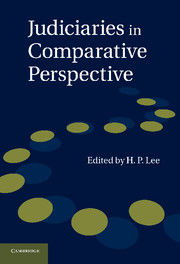Book contents
- Frontmatter
- Contents
- Contributors
- Foreword
- Preface
- Table of cases
- Table of statutes
- Part I
- Part II
- Part III
- Part IV
- Part V
- 20 Judges and non-judicial functions in Australia
- 21 The impact of extra-judicial service on the Canadian judiciary
- 22 Judges and the non-judicial function in New Zealand
- 23 Judges and non-judicial functions in South Africa
- 24 Judges and non-judicial functions in the United Kingdom
- 25 Judges and non-judicial functions in the United States
- Part VI
- Index
- References
24 - Judges and non-judicial functions in the United Kingdom
from Part V
Published online by Cambridge University Press: 07 September 2011
- Frontmatter
- Contents
- Contributors
- Foreword
- Preface
- Table of cases
- Table of statutes
- Part I
- Part II
- Part III
- Part IV
- Part V
- 20 Judges and non-judicial functions in Australia
- 21 The impact of extra-judicial service on the Canadian judiciary
- 22 Judges and the non-judicial function in New Zealand
- 23 Judges and non-judicial functions in South Africa
- 24 Judges and non-judicial functions in the United Kingdom
- 25 Judges and non-judicial functions in the United States
- Part VI
- Index
- References
Summary
From Lord Denning on the Profumo scandal to Lord Franks on the Falklands war, from Sir Richard Scott on the sale of arms to Iraq to Sir Anthony Hammond on the Hinduja brothers and the Dome, judicial inquiries have never destroyed governments. The evidence they collect is immensely useful. Eight years before he tore into a Labour government for overthrowing the genocidal Iraqi tyrant, Robin Cook used the facts revealed by the Scott inquiry to tear into the Conservative government for arming the genocidal Iraqi tyrant. But the judges’ punches are always pulled. In the case of the Scott report, no minister had to resign because Sir Richard presented a six-volume report that offered no damning conclusion – indeed, it had no conclusions whatsoever.
The United Kingdom constitution has witnessed significant change in recent years. The tremendous pace of change is part of an effort to modernise the constitution, which has had a significant impact on the judiciary. New developments include the ‘abolition’ of the office of Lord Chancellor (followed by a modification of this office), the establishment of the Judicial Appointments Commission, the opening up of some judicial appointments to public competition and the creation of the new Supreme Court for the United Kingdom. These reforms serve to ensure better separation of powers and to safeguard the independence of the judiciary.
- Type
- Chapter
- Information
- Judiciaries in Comparative Perspective , pp. 493 - 511Publisher: Cambridge University PressPrint publication year: 2011

